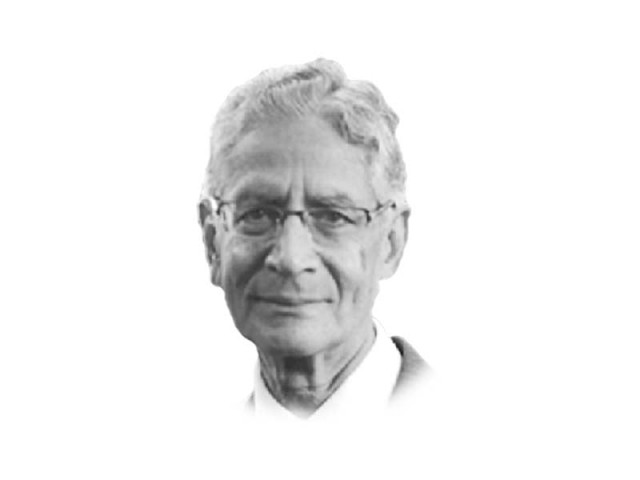US-Pakistan relations: can a lobbyist help?
In US-Pakistan relations, Pakistan feels it has given more than it has got. But it is wrong

The writer, a former ambassador, teaches at Georgetown and Johns Hopkins University, USA
There are some fundamental issues involved here at the heart of which is how the interests of each are being impacted by the policies of the other. And that is not something a lobbyist can fix. The fact is some Pakistani and American interests may be shared or common but others are on the opposing sides. Not only that, even on shared interests their perceptions and sometimes policies are different. Over time the two sides have tried to reconcile these irreconcilables. They did not succeed but did not let the negatives overwhelm the relationship. This was relatively easy to do during the Cold War. The White House ran the 1980s Afghan war and Pakistan was run by the military. The US found it easy to deal with a client state run by a compliant regime presiding over a pliant population. When the job was done, Washington walked away and slapped sanctions, only to return when Pakistan was needed, behaving as if nothing had happened in the time between. What a way to create a trusted relationship! And in time Pakistan learnt to pay back in the same coin.

But times have changed. And not just because of 9/11. The world began changing long before. The end of the Cold War, globalisation, the information revolution, media and internet explosion and a wave of democracy were changing the attitudes of populations of America’s erstwhile dependent allies where political consciousness was rising as was nationalism. The international and domestic orders were coming under challenge from liberal and illiberal forces alike. US foreign policy and relations with Washington were being questioned.
And America itself has been changing. Incited by 24/7 cable TV, social media, radio talk shows, advocacy groups, think tanks and special interests, public opinion has become partisan and hyperactive. And in a polarised political environment this means the politics of issues has become more important than policy. America’s post-9/11 wars have caused consequences for itself and others in a world that has become competitive, complex and unpredictable, if not dangerous; and above all, difficult to relate to. American leadership, like in other advanced democracies, has been finding it hard to explain and get domestic consensus over critical issues and make good policies, especially as there are multiple stakeholders, competing priorities and conflicting voices.
But that is not the only thing that has changed as far as impact on Pakistan is concerned. South Asia has changed and so has the way world powers relate to it. A resurgent China and a rising India now present strategic challenges and economic opportunities as never before. The region also presents some serious threats. The relationship with Pakistan is important to America’s security and strategic interests and for the strategic stability of South Asia, but the problem is Pakistan is bristling with issues of high public concern that are a grist to the media mill and thus consequential for the world of politics, making it hard for Washington to have a good policy towards Pakistan.
In Pakistan, it is hard to imagine the long-term damage done in the US to its trustworthiness by the AQ Khan affair and Osama bin Laden’s stay in Pakistan for nearly a decade, and to its reliability as an ally by the bitterness felt by the US military over the undermining of the Afghanistan war by Taliban sanctuaries. Washington not only has an unfinished war in Afghanistan but also an extraordinary new relationship with India. And Pakistan’s policies are seen as negatively impacting American interests there. Pakistan’s image and its policies thus affect both US politics and foreign policy interests and excite Congress and the media, and energise the whole spectrum of the American system where Indians now have a visible presence or influence. All this is contributing to the difficult relationship.
America is insensitive to Pakistan’s legitimate strategic interests and to the enormity of challenges to its internal security which, Washington feels, Pakistan has brought upon itself by living dangerously, and that it should change its policies not just for America but for its own sake. But Pakistan blames it all on the spillover of a troubled Afghanistan war. It plays the victim card, but how can you claim to be a victim of forces you have not disowned? Last but not least, Washington thinks if it gives money it can ask Pakistan to do things even against the country’s own interests. It demands unconditional compliance and promises conditional support. But Pakistan thinks it has given more than it has got. Both are wrong but neither will change.
So when American people ask, and legitimately from their standpoint, “Is Pakistan really a friend?”, can a lobbyist give a better answer than Pakistani leaders, or diplomatic officials? Lobbyists don’t bake the cake. They only put an icing on it. And in the case of US and Pakistan, they both want to have their cake and eat it as well.
Published in The Express Tribune, July 26th, 2016.
Like Opinion & Editorial on Facebook, follow @ETOpEd on Twitter to receive all updates on all our daily pieces.













COMMENTS
Comments are moderated and generally will be posted if they are on-topic and not abusive.
For more information, please see our Comments FAQ